Many businesses today ask, "What is custom software development?" Custom software development is about creating tech that fits a business's needs, helping it work better and outdo competitors. With custom software, companies can change things up as needed, which isn't something you can easily do with ready-made software off the shelf. The process of making this kind of software is pretty detailed, so working with the right team is essential to assuring its successful development, launch, and upkeep.
Aloa provides clients with custom software development services across multiple industries and sectors. Our team works with a global partner network to deliver custom solutions on time, on budget, and in high quality. We've vetted over 10,000+ agencies and professionals in the software development space to develop a team of highly skilled professionals to work with our clients.
Using our experience, we'll answer the question ofWhat is custom software development.. This blog will discuss when to consider such services, the factors to consider, and the main benefits of custom software development services.
After reading, you'll completely understand custom software development and the multiple ways it can benefit your business in today's fast-paced market environment.
Let's get started!
What is Custom Software Development?
Definition
Custom software development is the process of designing, creating, deploying, and maintaining software tailored to meet the specific needs of individual businesses or users. It involves a detailed analysis of the client's needs and developing a bespoke solution that aligns perfectly with their objectives.
This approach ensures that the software integrates seamlessly with existing systems, enhances operational efficiency, and provides a competitive advantage. Unlike off-the-shelf software, designed for a broad audience with generalized features, custom software addresses a particular entity's unique challenges, workflows, and requirements.
Let's look into the process of custom software development.
The Custom Software Development Process
Regardless of the type of software development project you have planned, they all involve following a general process. Here, we'll go through how to leverage custom software development services. These steps offer assurance that the development process will run smoothly. Skip them, and you may face huge risks during implementation that could derail or halt your development progress.
Consider each of these steps carefully to ensure a smooth transition from each phase until the custom software gets integrated into your business system:
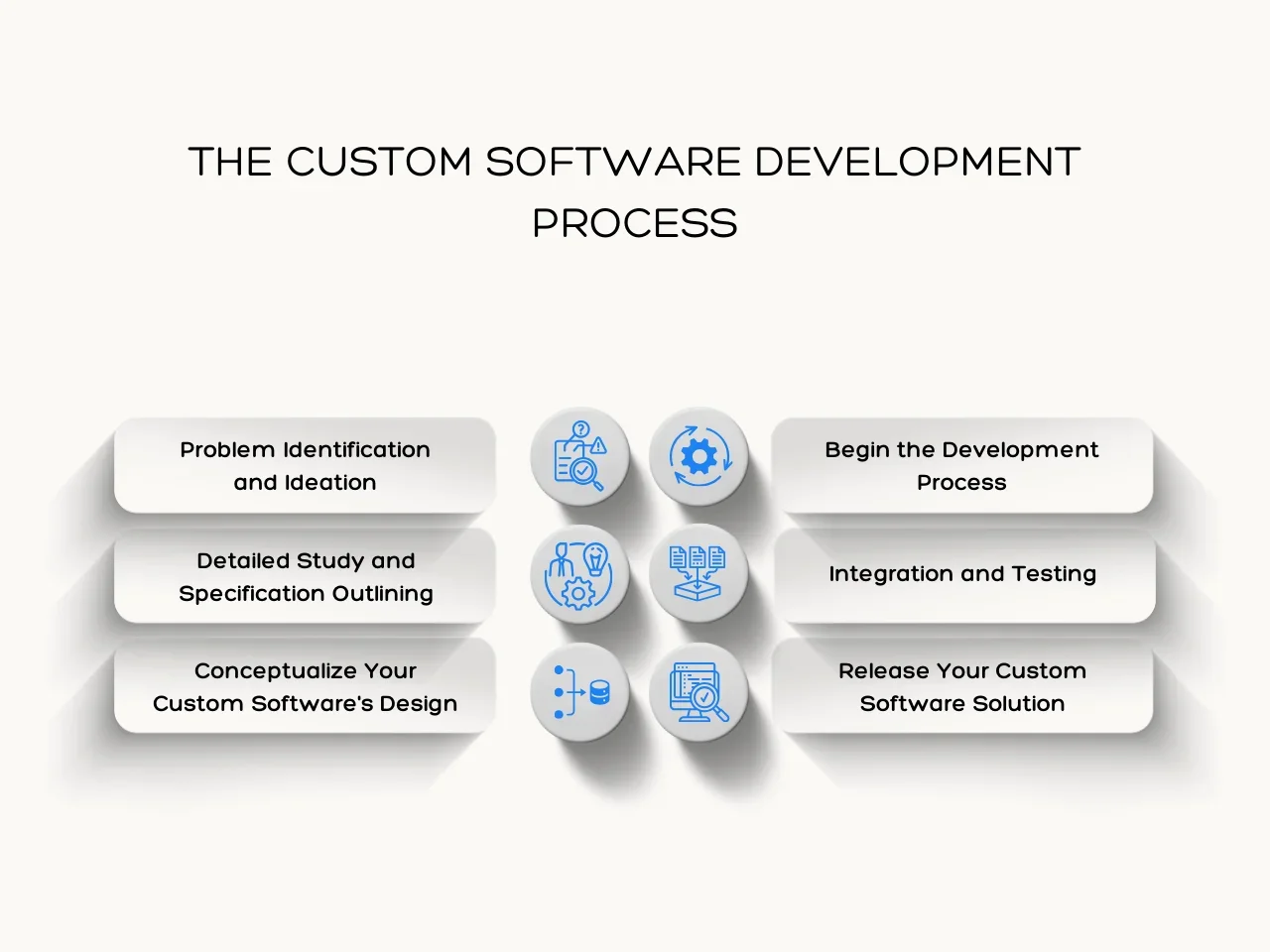
Stage 1: Problem Identification and Ideation
Before you begin building the actual software solution you have in mind, it's important to consider current business problems and needs and how the custom software solution will address or solve them. These should be outlined in the project scope or project plan.
Taking the time to undergo this assessment ensures that the custom software solution you create will work towards streamlining your processes. It also ensures it is developed in a manner that provides a tailored solution based on the problems you encounter daily.
With that, you'll realize more efficient and productive workflows that increase your business's potential, capacity, and capability toward increased ROI. Here are a few key concepts to keep in mind when identifying the problems your business needs solved:
- Understand Business Goals: Align the custom software development goals with your broader business objectives.
- Identify Pain Points: These pain points can range from manual data entry errors to a lack of software integration between systems or inadequate reporting capabilities.
- Gather User Feedback: Engage with key stakeholders and end-users to gather feedback on existing systems and processes.
- Define Requirements and Prioritize: Prioritize these requirements based on their impact on business operations and alignment with strategic goals.
- Create Potential Use Cases: Use cases help validate requirements, refine functionality, and ensure the solution addresses all necessary business processes.
Identifying these core elements of your custom software solution becomes the roadmap for software product ideation. Knowing your business needs lets you decide which features and functionality to include in the final software.
Stage 2: Detailed Study And Specification Outlining
Having identified the pain points and problems your business faces, you can start to dive deeper into research. Your research should focus on the possible ways custom software development solves these problems. Here's a quick process of going about your research outlining:
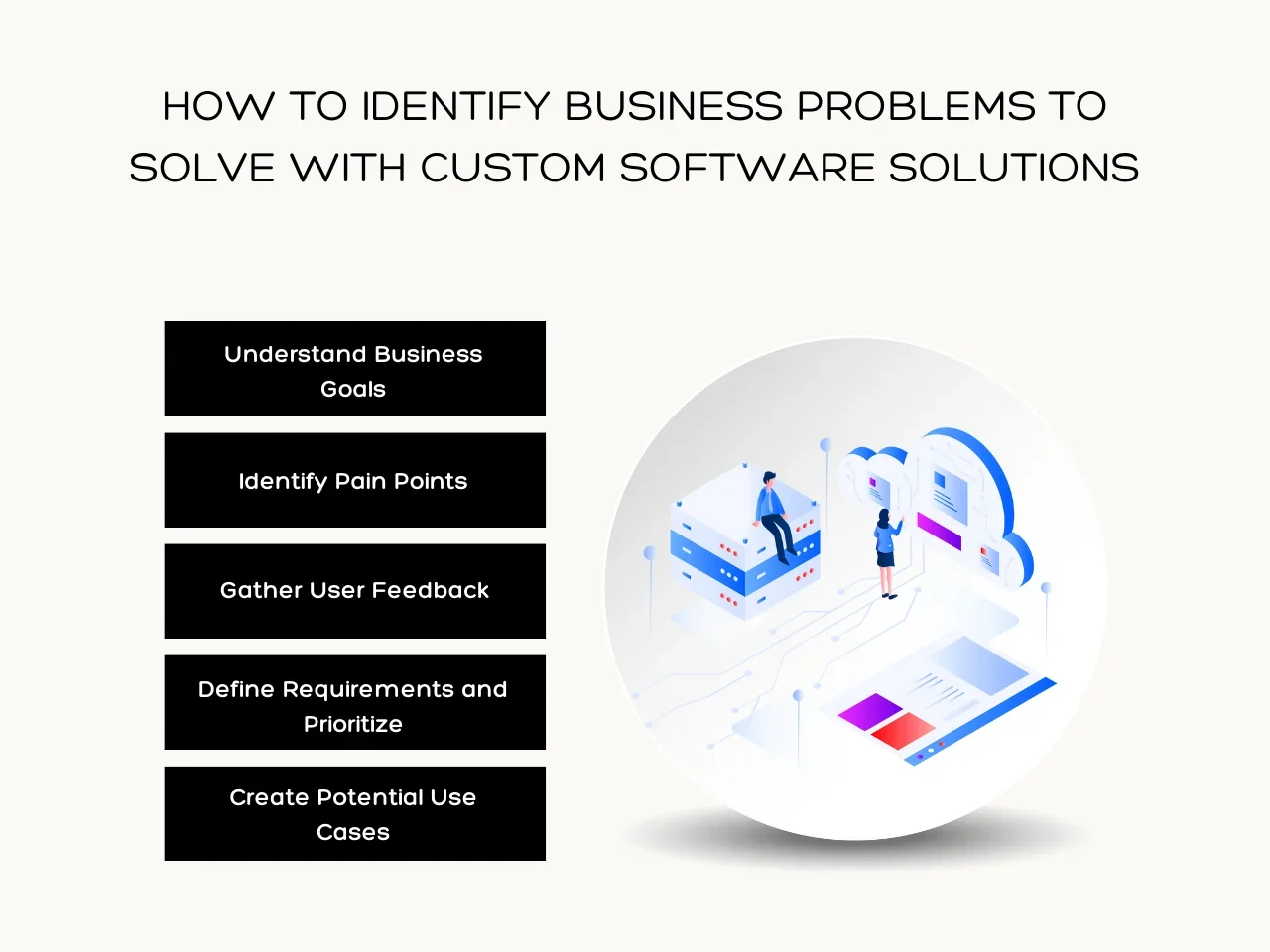
- Consult with Software Development Experts: Collaborate with them to brainstorm innovative ideas and explore different approaches to solving your business challenges through custom software solutions.
- Weigh out the Pros and Cons: Evaluate the advantages and disadvantages of various software development options. Consider factors such as development costs, time to market, scalability, maintenance requirements, and potential risks associated with each approach.
- Discuss Plans with Stakeholders and Development Teams: Share findings from your research and gather input on specific requirements, priorities, and expectations for the custom software solution.
- Include Final Users: Conduct usability testing and prototype reviews to validate assumptions and refine specifications based on user insights.
Whether you are working with an in-house team of developers or nearshore software development experts, crafting a detailed study for a tailored solution involves the same level of diligence and thoroughness. During the collaboration efforts, you should also discuss the outline of specifications. This enables you to discover if there are any functionalities and features you need to include.
Lastly, your collaboration will also cover the technical corners that may need attention when it is time to upkeep, update, or scale the software solution. Here, you'll also identify the programming language skills developers must possess to ensure successful project completion.
Stage 3: Conceptualize Your Custom Software's Design
When it comes to designing your custom software development solution, UI design ensures that it is user-friendly and appealing. When considering the design, it's best to look through the portfolios of the companies you plan on partnering with.
Here are the critical design elements to watch out for when vetting developers and custom software development services:
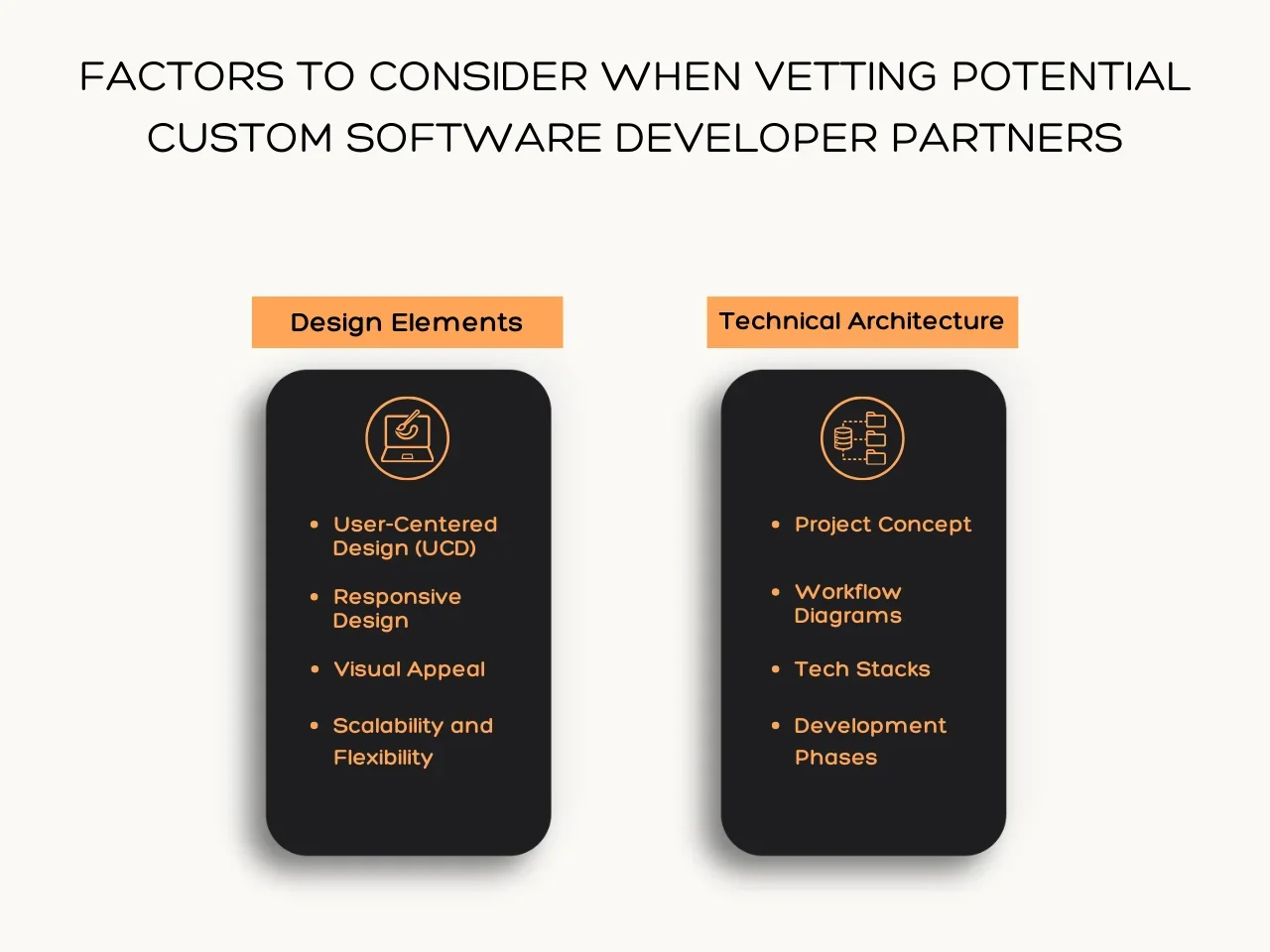
- User-Centered Design (UCD): Look for portfolios that showcase an understanding of user needs and persona development, ensuring the software meets diverse user requirements.
- Responsive Design: Ensure developers understand the core concepts that enable software to adapt seamlessly to various devices (desktops, tablets, smartphones) and screen sizes without compromising usability or functionality.
- Visual Appeal: Evaluate whether a provider applies modern design principles and follows the concepts of visual hierarchy.
- Scalability and Flexibility: Consider designers' ability to apply scalability and flexibility for customizable features or layouts to cater to diverse user preferences and organizational needs.
Apart from the UI design, it would help if you also discussed the technical architecture with the custom software development companies you hope to work with. Technical architecture involves the following elements:
- Project Concept: Clearly define the project's vision, goals, and scope to align all stakeholders and development teams.
- Workflow Diagrams: Create workflow diagrams or process maps to visualize how data and processes will flow through the system.
- Tech Stacks: Discuss and finalize the technology stack that best suits your project requirements, considering factors like scalability, security, and future maintenance.
- Development Phases: During this stage, you can also start to break down the project's phases into actionable modules and tasks.
Stage 4: Begin the Development Process
The development phase is the most crucial step in the process. You will apply the actual design specifications and turn them into a functional software solution at this stage. Here, coding starts to build up the custom software.
There are multiple ways to approach project development, and it is up to you and your chosen custom software development company partner on which methodology to apply to implementation.
You can apply the following methodologies based on requirements and needs:
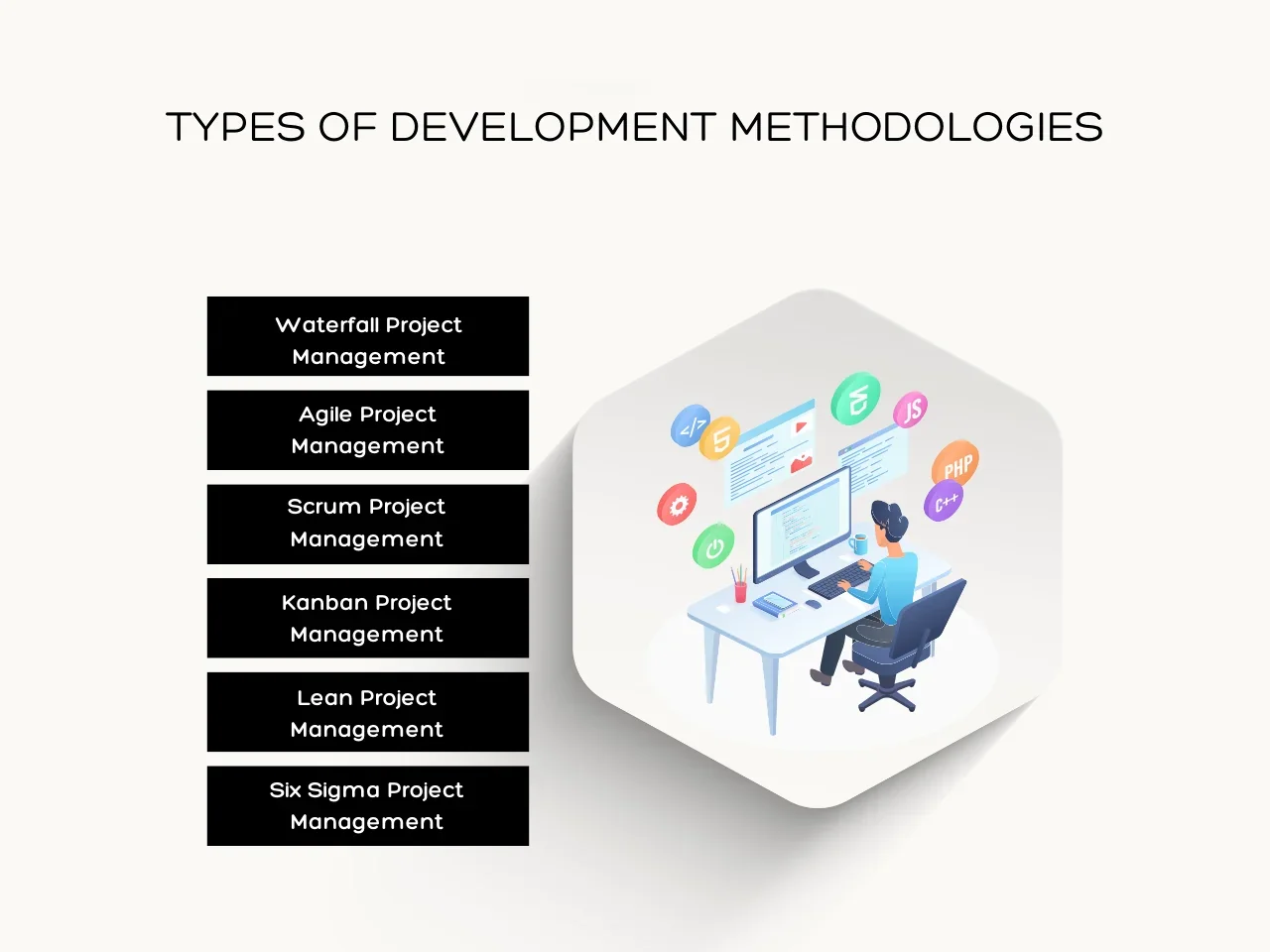
- Waterfall Project Management: A traditional approach to project management that applies a linear and sequential process through distinct phases. Each phase must be completed before the next one starts. It is a slower approach than others, but it offers clarity, control, and predictability.
- Agile Project Management: A modern and versatile approach that emphasizes flexibility, collaboration, and iterative progress. It allows for continuous feedback, frequent adjustments, and the ability to respond quickly to changing requirements and environments.
- Scrum Project Management: This derivative of the Agile approach involves forming small teams to oversee specific tasks. Scrum emphasizes teamwork, accountability, and iterative progress toward a well-defined goal.
- Kanban Project Management: Another Agile approach focused on considering all the tasks and looking for ways to streamline the processes involved.
- Lean Project Management: Like Kanban, it focuses on streamlining processes. It is a more customer-centric approach that looks for ways to make the software more time-efficient and affordable for users.
- Six Sigma Project Management: A data-driven approach aimed at improving the quality of processes by identifying and removing the causes of defects and minimizing variability in manufacturing and business processes. It is highly structured and follows a set of quality management techniques and statistical methods to achieve its goals.
Deciding which approach to take can also be discussed ahead in stage 2.
Stage 5: Integration And Testing
With the custom software built, it's time to start integration and testing to check whether it performs efficiently and in the manner it should. You should also check if it has all the functions outlined in the ideation stage. At this stage, beta testers also gain access to the software to test out its quality of interaction. With the results gathered from the beta test, you can identify and fix any bugs.
Additionally, software testing tools can help ensure the developed software's efficiency, functionality, and quality during this stage. These tools reduce manual effort and time and enhance the software's reliability and stability before end-user deployment.
Stage 6: Release Your Custom Software Solution
Once you've addressed any issues and bugs and finalized testing, it's time to plan and execute the release of your custom software solution. At this stage, the developers should have confidence that their developed solution is stable and functional enough to ensure a successful deployment.
Another important part of releasing your solution involves training the intended users to use the software properly. You can accomplish this by having orientation sessions that focus on how to navigate minor bug fixes and what to do if issues that require more expertise arise.
Now that you understand the process of "what is custom software development," you can start to consider whether or not you require such solutions. Let's review some circumstances where custom software development is essential.
When is Custom Software Development Needed?
Whether you need custom software development for your business depends on several key factors that reflect your organization's specific needs and objectives. Here are 7 instances that point toward the need for custom software solutions:
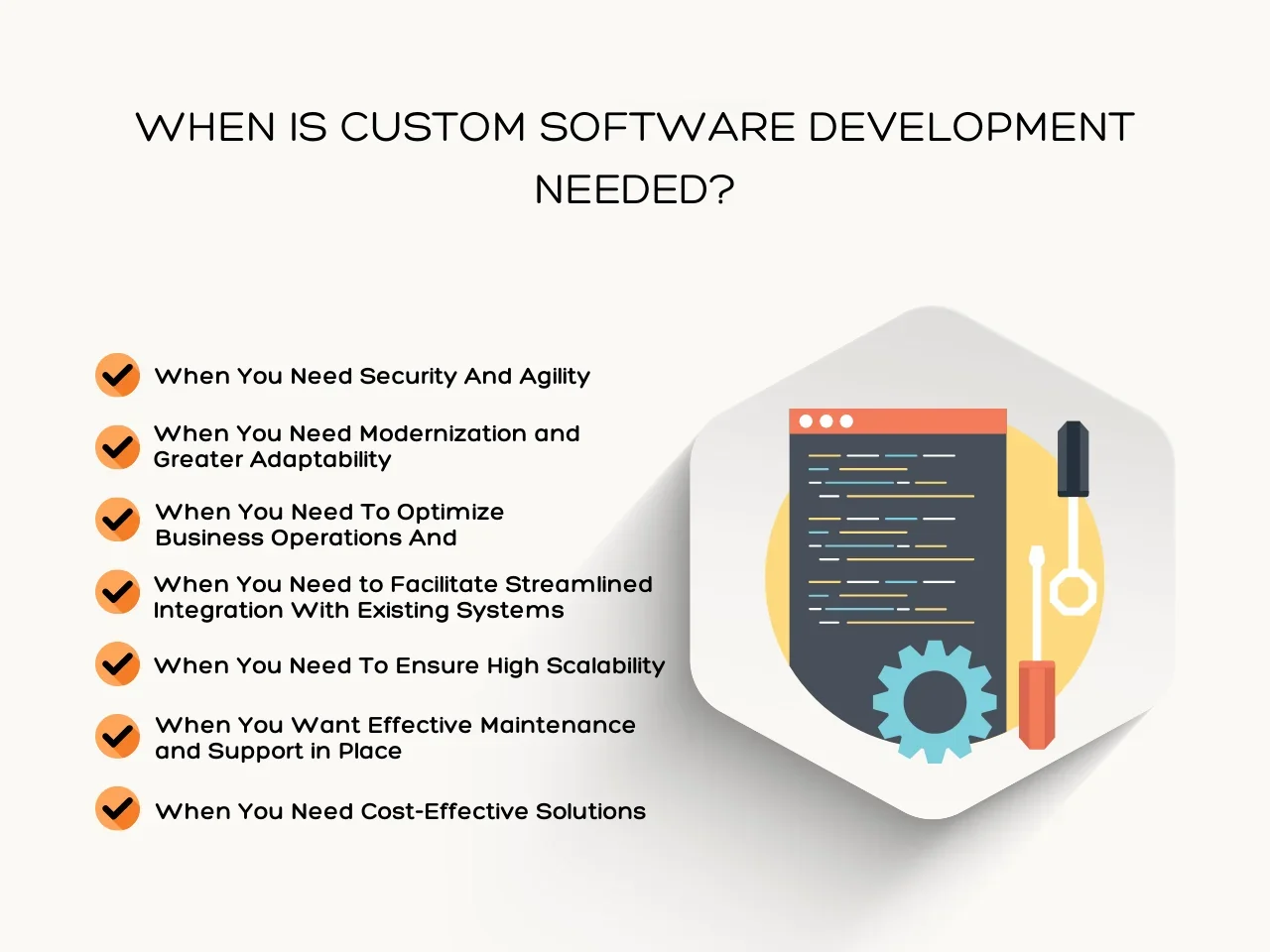
1. When You Need Security And Agility
Choosing custom software development services allows you to add key features and functionalities to your solution based on business requirements. These functions can include more robust security capabilities, highly customer-centric user interfaces and experiences, personalized dashboards, tailored automation workflows, and seamless integration with existing systems and third-party applications.
Customization enables precise alignment with operational needs, enhances user satisfaction, improves efficiency, and strengthens your competitive advantage in the market. So, to create quality software with improved functionalities, consider working with a custom software development company to build your solution.
2. When You Need Modernization and Greater Adaptability
Modernization and adaptability are two critical components that businesses must consider. As business environments evolve, choosing custom software development enables you to adapt to changing marketing trends. This results in your capability to respond quickly to new opportunities, technological advancements, and shifts in consumer preferences.
Custom software can be designed with flexible architectures and scalable frameworks that facilitate seamless upgrades and integrations with emerging technologies. It ensures that your business remains agile, competitive, and capable of leveraging innovations to maintain or enhance market leadership.
3. When You Need To Optimize Business Operations And Workflows
Optimizing business operations and workflows means streamlining any processes that can be improved for efficiency, productivity, and cost-effectiveness. For example, suppose a business' main operation is handling customer concerns and issues. In that case, custom software allows them to manage queries and communications efficiently.
Using custom solutions also allows businesses to take advantage of a custom software development service to build CRMs that can handle the technical process of day-to-day tasks with a high level of security. This ensures that everything runs smoothly while safeguarding business information at the highest level.
4. When You Need to Facilitate Streamlined Integration With Existing Systems
Various departments in large companies operate in different ways, even if they work within the same organization. In such cases, challenges often arise when it comes to integrating the process flows of one department into another. This can cause compatibility issues that lead to decreased efficiency and productivity.
With that said, knowing the concepts behind "what is custom software development" proves beneficial. Applying custom software solutions to create tailored solutions allows businesses to integrate multiple systems into one software application. In turn, enterprises realize streamlined and automated processes across various departments and turn them into one centralized system.
5. When You Need To Ensure High Scalability
Startups and big corporations aim to scale their businesses to realize higher revenue. Throughout that process, challenges may arise regarding development processes that impact business growth.
Using custom software solutions, you can more easily plan and prepare to address foreseen challenges and roadblocks. It integrates advanced tools to speed up processes and boost revenue. Businesses looking to enhance their capability for future growth do well to use such solutions to scale quickly and efficiently.
6. When You Want Effective Maintenance and Support in Place
Working with a custom software development company to create tailored business software solutions allows businesses to benefit from specialized maintenance and support services. This approach ensures that your software remains reliable, up-to-date, and capable of evolving with your business needs.
7. When You Need Cost-Effective Solutions
Developing a custom application is a costly investment initially, especially for startups. However, it is the more cost-effective option in the long run. This is because custom software solutions allow businesses to design a system that caters to highly specified business requirements. It also prepares you for future developments without updating a subscription or looking for alternatives should off-shelf solutions become outdated.
Additionally, off-shelf solutions come with a set list of features, making them rigid when you need more. With custom solutions, you can easily add or remove functions and features to match unplanned changes. With that in place, you can save on future operating development costs.
5 Reasons Why You Need Custom Software Development
Generally, custom software development helps businesses with their processes, customer interactions, and collaboration within departments and partners. Let's consider the benefits and dig a deeper into each one to help you gauge whether seeking custom software development services is worth the investment.
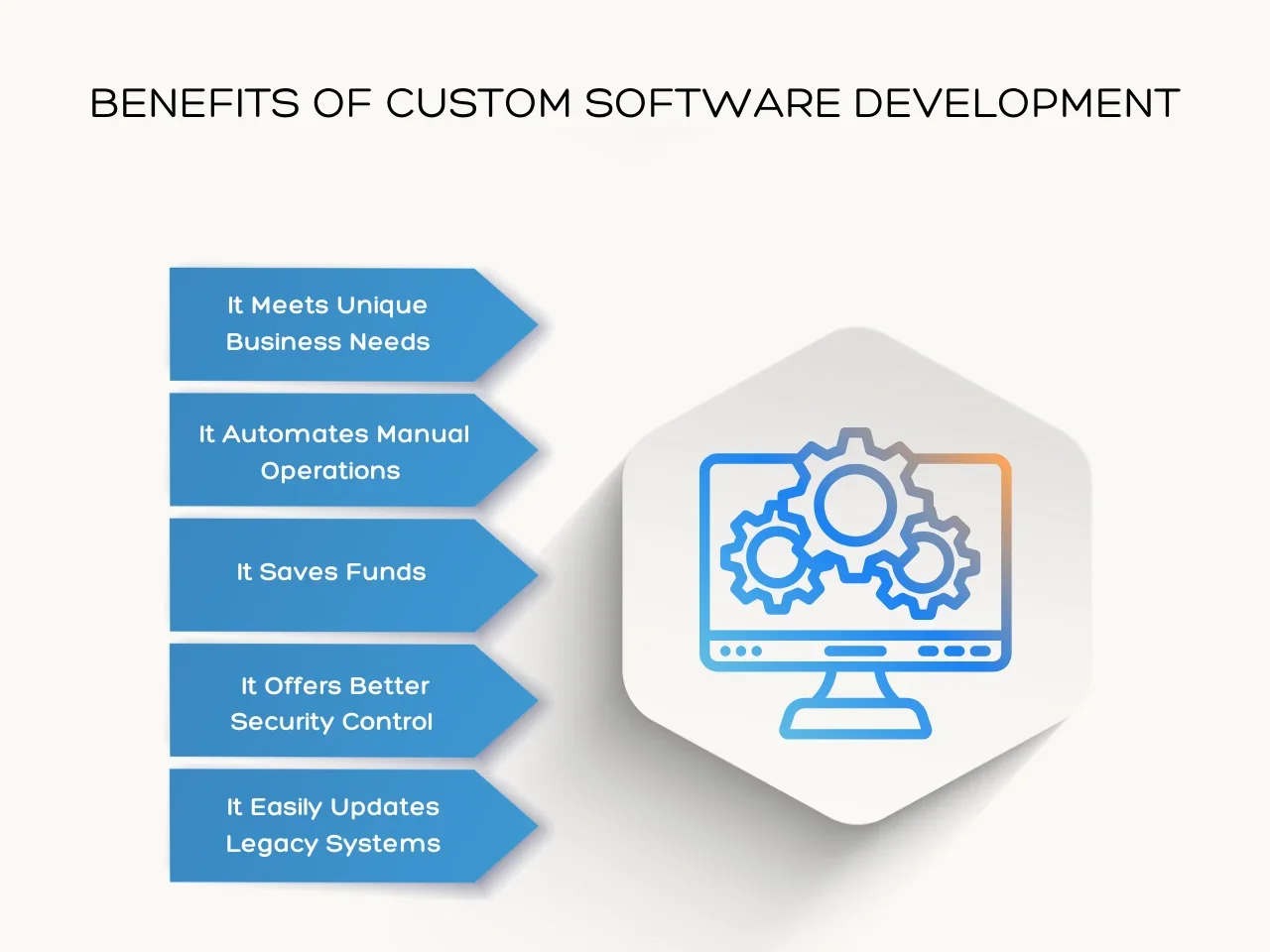
1. It Meets Unique Business Needs
Every organization has unique needs regarding its processes, operations, and challenges. This also extends to varying security regulations depending on the nature of the business and local requirements.
Applying tailored software solutions enables businesses to provide personalized solutions for these core requirements. With that, adding and improving current functionalities is easier as business needs evolve and scale to meet growing demands and changing market landscapes.
2. It Automates Manual Operations
Automating manual operations saves time and money. Automated processes provide an efficient way to accomplish daily requirements that would otherwise require time-consuming, repetitive manual actions. Using automation features in custom software streamlines these operations, leaving more time to handle other core business functions that require high-priority attention.
That way, team members and leaders can apply an efficient workflow that prioritizes business growth and development rather than wasting time on upkeep and administration.
3. It Saves Funds
Many businesses fall into the pitfall of assuming that off-the-shelf software solutions that require one-time payments or monthly subscriptions are more cost-effective than investing in custom-made options. However, considering the long-term business growth and scale, you'll realize that custom solutions save more funds.
Custom software development allows users to add, update, and improve existing functions with the help of custom software development service providers. On the other hand, off-shelf solutions need more room for additional functions. You may pay for multiple ready-made solutions that increase operational costs over time.
4. It Offers Better Security Control
Businesses today face a growing threat of cyberattacks, which are caused by hackers looking to access and use sensitive information for personal gain or use. Cyberattacks leave your company information vulnerable and can cause high levels of risk and damage if not mitigated. Hackers can easily target off-the-shelf solutions since it is simple to break down the security measures they have in place.
The modifications made strengthen its security when it comes to custom software development solutions. Businesses can incorporate stricter security policies and encryption to increase security. Additionally, since these solutions are not publicly accessible, it is easier to safeguard their use and ensure asset protection.
5. It Easily Updates Legacy Systems
Legacy systems are outdated computer systems, software, or technologies that are still in use, often because they continue to serve critical business functions. However, these systems can be challenging to maintain and integrate with newer technologies.
Custom software development solves these challenges by providing several key benefits, such as modernization, seamless integration, enhanced security, and scalability. With these key benefits in place, legacy systems can continue to serve critical business functions while keeping up with technological advancements.
Shelf Software Solutions Vs. Custom Software
Going through the core use cases and benefits surrounding the question, "What is custom software development?" gives you a good idea of how it compares to off-the-shelf software solutions. To clarify further, let's go through the main factors that set them apart from each other:
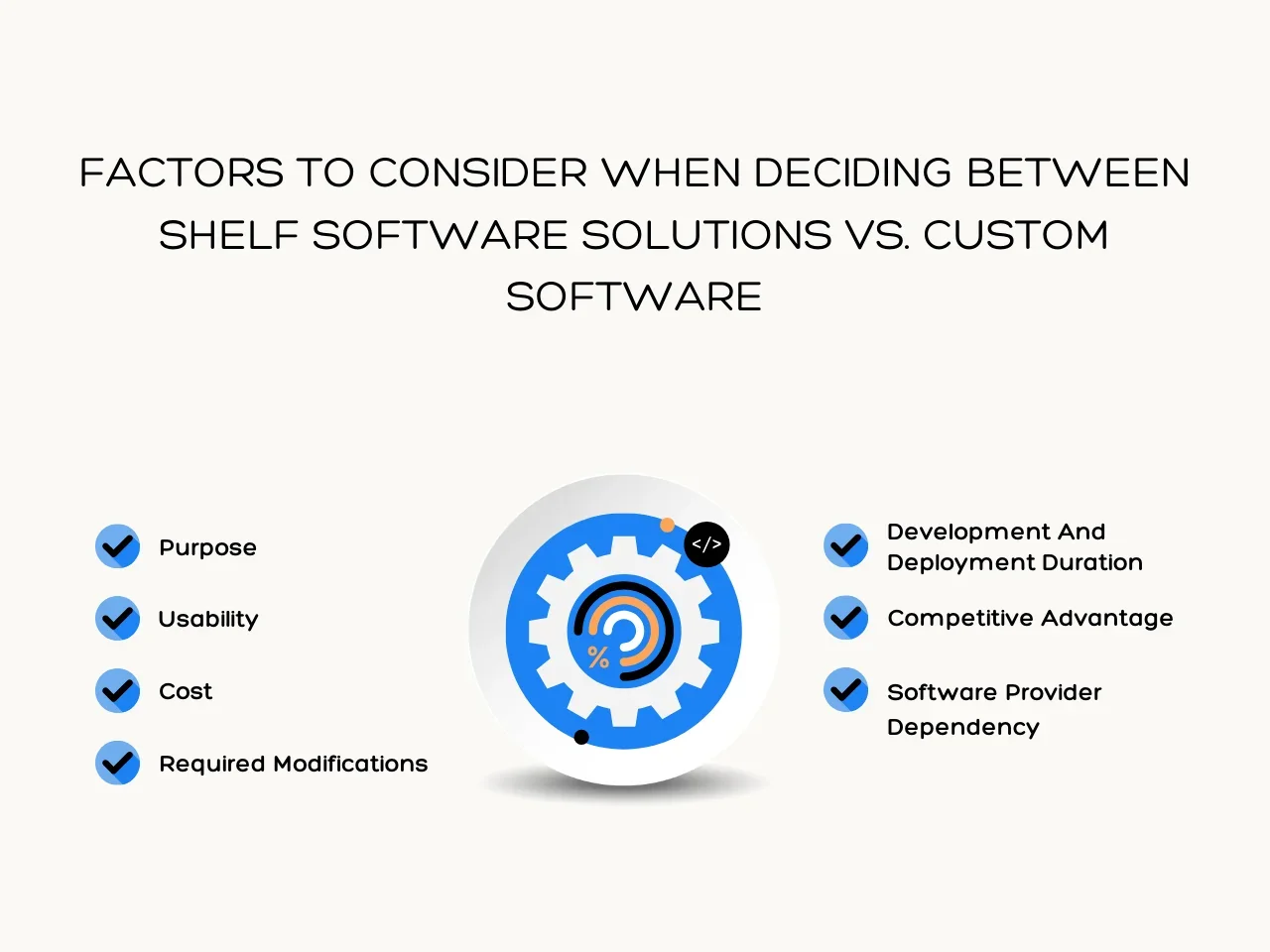
Factor 1: Purpose
The primary purpose of a custom software solution is to provide a robust and modified digital product that satisfies specific business requirements. Off-the-shelf software solutions offer only a standard framework and design. With custom solutions, businesses can tailor features and functions based on existing workflows, processes, and requirements.
On the other hand, businesses must modify and tailor their workflows and processes to match the capabilities of off-shelf solutions. In comparison, working with tailored solutions allows more freedom to build efficient internal processes instead of working around the limitations of ready-made software solutions.
Factor 2: Usability
In terms of usability, custom software meets specific needs as it is designed to be used by one organization, applying integrations that address precisely what is necessary. Off-shelf software is made to be a one-size-fits-all solution for multiple business types and industries. Generally, this makes its core usability less tailored to specific workflows and unique requirements of business processes.
Factor 3: Cost
Initially, custom software was shown to be the more expensive option, but as the need for expansion and additional integrations arises, it proves the more cost-effective solution. Off-shelf options usually have a lower initial cost but become pricey once you realize you need to pay additional fees for custom functions, ongoing maintenance, and subscription fees.
Custom software benefits those looking for a solution that accommodates long-term goals. However, if you require a solution for the short term, off-shelf options meet the necessary requirements in the immediate timeline.
Factor 4: Required Modifications
As mentioned in the previous sections, custom software is readily adaptable to modifications. In comparison, off-the-shelf solutions are hard to modify and require purchasing separate software. The ability to apply changes in a flexible and efficient manner is a significant advantage of custom software.
Factor 5: Development And Deployment Duration
The duration of development and deployment is a crucial factor when considering custom software versus off-the-shelf solutions. While the initial development of custom software might take longer than deploying off-the-shelf solutions, the overall deployment duration can be more efficient. Custom software minimizes the need for extensive customization and integration, provides targeted testing, and reduces the learning curve for users, resulting in a streamlined and effective deployment process.
Factor 6: Competitive Advantage
Custom software solutions for product development improve user experience and give businesses an edge over competitors. Unlike off-the-shelf software that offers generic solutions, they are designed to meet each business's unique needs and challenges.
Focusing on user-centric design enhances usability and satisfaction. In turn, businesses can realize higher adaptation rates and reduced training times. Overall, it leads to innovation and allows businesses to introduce a new way to differentiate themselves in the marketplace and gain a competitive edge.
Factor 7: Software Provider Dependency
Since custom software has well-designed interfaces and is made with scalability in mind, there is limited to zero need for dependency on the provider. In cases where you'll need additional functions, you can work with a custom software developer or staff augmentation developers to build and add the required features.
In the case of off-the-shelf solutions, you will need to invest more funds to incorporate new features or create new software independently while maintaining constant communication with the provider. This dependency poses a problem since off-the-shelf software is typically designed with a broad user base in mind, meaning it may not fully align with your specific business processes or evolving needs.
Consequently, integrating new features can be complex and costly, requiring extensive customization or even necessitating the development of entirely new software modules. This process increases development time and introduces potential compatibility issues and ongoing maintenance challenges.
Industries that Need Custom Software Development Services
Custom software development services benefit a handful of modern business types and industries. In line with that, there are multiple types of custom applications to develop. If you need help determining which type of custom software your business needs, you can work with custom software developers for recommendations.
To get started, you can explore the list below of the most popular application types:
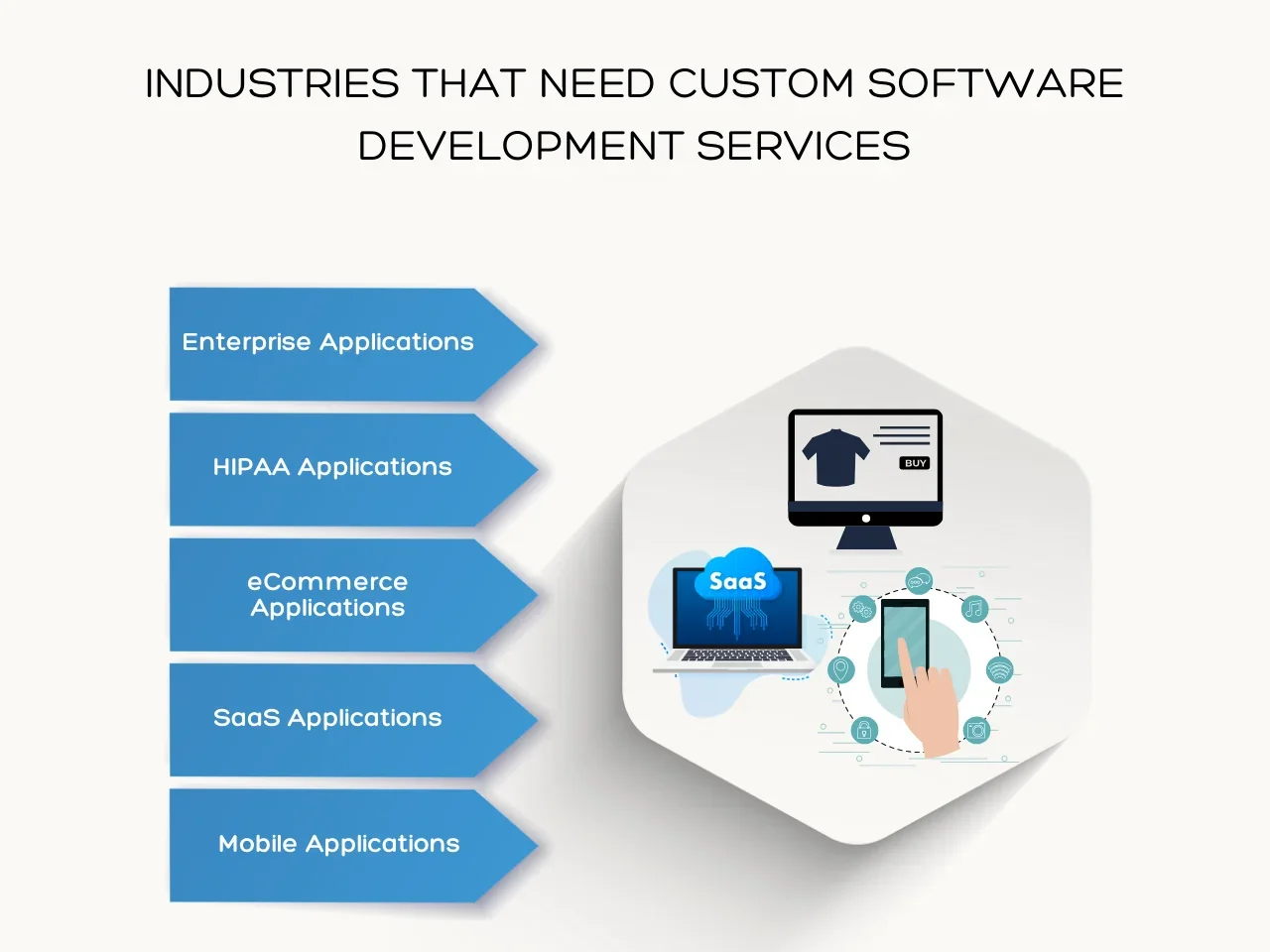
1. Enterprise Applications
Enterprise applications manage and share information across organizations and play a crucial role in streamlining business processes and enhancing collaboration. These types of custom applications are designed to address the complex needs of large organizations by integrating numerous functions and departments into a cohesive system. Some industries that usually require enterprise applications are government, education, and similar large institutions.
2. HIPAA Applications
HIPAA applications enable the healthcare industry to ensure compliance with strict regulatory standards regarding patient data security and privacy. Custom HIPAA applications streamline secure storage, transmission, and access to sensitive medical information while adhering to HIPAA regulations.
Healthcare providers, medical practices, and organizations working with patient data rely heavily on custom HIPAA-compliant software to manage electronic health records (EHRs) and maintain patient confidentiality.
3. eCommerce Applications
ECommerce applications integrate into an organization's current website, facilitating online sales, streamlining inventory management, and enhancing customer shopping experiences. These custom applications play a crucial role in the digital marketplace by providing robust functionalities tailored to the specific needs of e-commerce businesses.
4. SaaS Applications
Software as a Service (SaaS) applications are cloud-based solutions that facilitate digital transformation and provide software functionality on a subscription basis. The SaaS provider hosts and maintains these applications, allowing businesses to access them online without needing on-premises hardware or software installation. Custom SaaS applications cater to various industries and business needs, offering several advantages.
5. Mobile Applications
Mobile applications are iOS and Android software that interact with customers. Mobile applications drive customer acquisition, retention, and engagement strategies for businesses across various sectors, including retail, hospitality, healthcare, finance, and entertainment.
Investing in custom mobile app development allows businesses to leverage the power of mobile technology in the long run. It also enables them to achieve a wider reach and deliver exceptional user experiences that drive growth and competitive advantage.
Choosing the right software development tools is essential for maximizing productivity as well, whether you're building applications, managing client projects, or handling document processing. Using a tool that can convert PDF to PPT enables businesses to efficiently repurpose reports, presentations, and proposals for different stakeholders. By selecting the best solutions, teams can streamline workflows, enhance efficiency, and improve collaboration across projects.
3 Tips When Hiring a Custom Software Development Company
Ensuring a smooth and secure collaboration with the best custom software development company requires keeping a few things in mind when working with them.
Here are some factors to consider when deciding on a service provider:
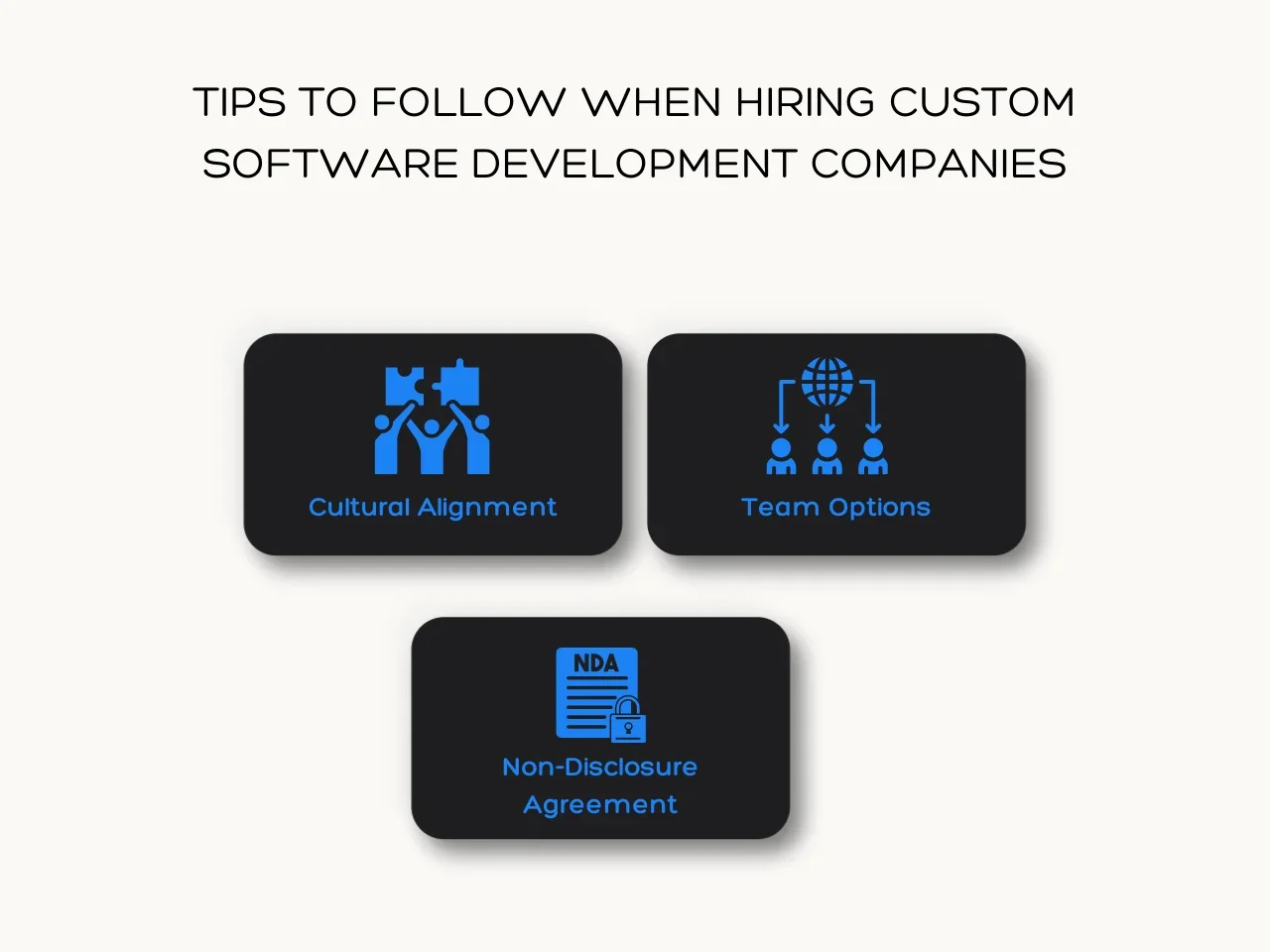
1. Cultural Alignment
Cultural alignment pertains to having the same values and work cultures as your team. In line with that, no matter what culture your company has, it's always best that you utilize a project management platform that gives you a high level of overview for your projects for an efficient working environment both for you and the development team.
As an option, Aloa offers clients a platform that keeps them updated on project happenings and statuses even if you do not have a technical background. You'll also work with a dedicated account manager who keeps in contact with you and your team to streamline the collaboration efforts during the development process.
Our team boasts a partner network of skilled custom software developers from around the world and customizable tools that provide accountability for bug fixes, daily standups, and more. Thus, we make working relationships a productive and collaborative experience.
Notable Features of Working with Aloa
- Extensive Partner Network: Aloa has vetted 10,000+ software agencies around the globe to identify and hire the best software developers.
- Rigorous Vetting Process: Every developer undergoes a thorough evaluation to ensure they meet Aloa's stringent quality and proficiency standards.
- Transparent Performance Reports: Aloa ensures consistent updates on the project's progress, allowing clients to stay informed and confident at every step.
- Dedicated Support System: Aloa offers continuous support throughout the software journey, from initial consultations to project completion. We're here for you.
Hire your team with us and start leveraging the benefits of custom software development for your business. Reach us at sales@aloa.co to learn more.
2. Team Options
When it comes to team options, you have multiple options to choose from. Today, businesses often outsource their software development to nearshore, offshore, or onshore teams to save on the operational costs of building an in-house team of developers. While each option has pros and cons, researching ahead of time or consulting with potential service providers will give you a clear idea of which option best suits your business goals.
3. Non-Disclosure Agreement
A non-disclosure agreement (NDA) is a legally binding contract between two or more parties that outlines confidential information they wish to share for specific purposes but want to restrict access to or by third parties. It creates a confidential relationship between the parties to protect confidential and proprietary information or trade secrets.
Knowing that it's essential to ensure that your application development idea doesn't get stolen or replicated, call the team to sign a non-disclosure agreement to ensure the security of your project.
Key Takeaway
"What is custom software development?" remains a popular question that businesses ask when looking for solutions for developing custom software.
Grasping “what is custom software development" is crucial for organizations looking to create bespoke solutions that enhance efficiency and competitiveness. With this guide to help you make an informed decision, you can explore custom software development companies to work with and start your project.
Businesses today benefit greatly from creating tailored solutions that directly address their unique challenges and opportunities. Custom software development allows organizations to meet specific needs in a cost-effective and scalable manner, allowing for high levels of growth and scalability.
Ready to start building a custom software solution? Contact our Account Executives at sales@aloa.co to learn more about our development process and gain access to a partner network of skilled developers.

